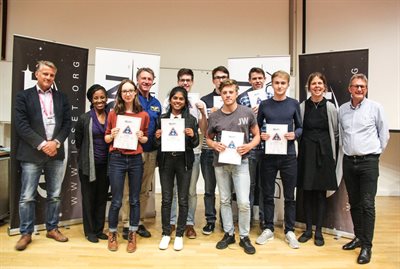King's Mission Discovery experiment launched into space
A science experiment designed last year at King’s College London’s Mission Discovery Summer School is being launched into space on 20 May to be carried out on the International Space Station (ISS).
Mission Discovery is a programme for UK & International students aged 14 to 18 who get the opportunity to come to King’s College London (KCL) for a week and work with astronauts, scientists and NASA leaders. Mission Discovery is a partnership with the International Space School Educational Trust (ISSET) and KCL.
The students formulate an idea for a biomedical experiment that can be carried out in space by NASA at the ISS. The week includes learning about a variety of areas of space research including; how the body adapts to weightlessness, working in space and completing missions and the benefits to the planet in conducting experiments in space.

There are three experiments by primary investigator Dr Julie Keeble from Centre for Human & Applied Physiological Sciences that are being taken to the ISS. One of these experiments titled ‘The Movement of Polar Liquids Across Electric Fields’ was designed by at King’s Mission Discovery last year by Dharshini Sambamoorthi, Tom Bailey, Robert Norris, Jonathan Hume, Matthew Newman, Rebecca Walters and Samuel Prime. The experiment observes the effects of microgravity on the movement of a polar liquid in the presence of an electric field.
The experiment will be carried to the ISS on an Orbital ATK Antares rocket on 20 May 2018 at 9.04 – 9.09 UTC.
Mission Discovery is delivered by King's College London academics and the International Space School Educational Trust (ISSET).
The programme is running again in 2018 in July and October. For more information about Mission Discovery at King’s click here.